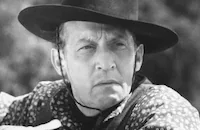Triumph
Brief Synopsis
Cast & Crew
Cecil B. De Mille
Leatrice Joy
Rod La Rocque
Victor Varconi
Charles Ogle
Theodore Kosloff
Film Details
Technical Specs

Synopsis
At the Garnet tin factory, hard-working forewoman Anna Land dreams of one day becoming successful and financially independent. Fellow worker William Silver, who harbors a crush on Anna, resents the spoiled factory heir, King Garnet, and constantly urges the other workers to revolt against their wealthy employer. One day, playboy King makes a rare visit to the factory and is captivated by Anna's feisty demeanor. At the Garnet estate, family lawyer Samuel Overton frets about King's extravagant, irresponsible lifestyle, which was fostered by King's kindly father David, who has been dead for almost two years. Only Overton knows that David had arranged a special addition to his will that stated that if King was not employed two years after his death, the Garnet estate would be transferred from King to a mysterious other person. The next day at the factory, Silver is disappointed when he asks Anna out only to discover that she has already accepted a date with King, leading him to believe that Anna favors King because of his wealth. Although attracted to King's playful charm, Anna also enjoys Silver's continued interest in her and at one point imagines both men as her suitors in a Romeo and Juliet scenario. Both Silver and King continue to shower Anna with attention over the next few weeks and although she falls in love with King, Anna is concerned by his refusal to behave responsibly and assume a profession. When Silver impatiently tries to impose his affections on Anna one evening, she rejects him, prompting King to take the opportunity to propose. Having learned of her secret desire to be a professional singer, King offers to provide Anna a ready-made career, but this only causes Anna to criticize King's empty existence. Meanwhile, frustrated by Anna's rebuff, Silver berates King at the factory only to be shocked when Overton arrives with the news that Silver has become the new estate holder and head of the factory as he is David Garnet's son from a secret European marriage. Believing that his new wealth will change Anna's opinion of him, Silver attempts to resume courting her, but Anna remains disinterested. Overton sadly reveals the details of David's will to King, who receives five dollars as his new inheritance without complaint. When a gloating Silver comes to the Garnet estate to make his claim, King departs cheerfully and visits Anna, who is dismayed when King remains careless about getting a job. Undaunted by Anna's rejection, Silver offers to pay for singing lessons for her with the famous singing teacher, Varinoff. Impressed by Anna's abilities at her audition, Varinoff asks her to sing at a famous, elegant club the following week. Dismayed that she cannot afford the evening gown she must wear for the performance, Anna is swayed by Silver's offer to provide her the dress and does not refuse when he presents her with a large diamond ring. Later when King visits Anna, she tries to hide the ring from him, but seeing it galvanizes King, who takes the ring and returns it to Silver, then writes Anna that he will not see her again until he has "made good." Over the following year, King struggles to survive at odd jobs while following newspaper coverage of Anna's growing success under Varinoff's tutelage, provided by Silver's money. Learning that Anna has become a sensation in Europe and has settled there, a down-on-his-luck King does not resist when the tin factory foreman, Jim Martin, runs into him and suggests he apply for work at the Garnet factory. King's willingness to start in the lowest position and work hard wins him the trust of the other workers who soon forget he was once the factory owner. Two years later, Silver has abandoned managing the factory in order to remain with Anna in France and unwisely becomes involved in a shady business investment, hoping to expand his wealth. Although Silver continues to propose, Anna consistently refuses. One evening, a fire breaks out at a penthouse party attended by Anna and Silver and smoke inhalation ruins Anna's voice. Embittered, Anna allows Silver to take her back home where, convinced that she has lost King forever, Anna finally accepts Silver's proposal. Silver returns to the factory where he is stunned to find that King has worked his way up to manager. When Silver attempts to fire King, Overton intervenes, revealing that Silver's poor business investments have forced the bank to take over the company, and they now demand that King be made its president. Although Silver is now penniless, Anna vows to fulfill her promise to marry him and returns to find work at the factory. King is delighted to be reunited with Anna, but, although happy to see him, she is embarrassed by her position. Resuming his old factory job, Silver again berates the callousness of the wealthy, but the workers ignore him. Jim reminds King that Silver is his half-brother, prompting King to offer Silver the managerial position and a share in running the company. Convinced that King has now assumed real responsibility, Anna declares her love for him and Silver gallantly steps aside to let the couple marry.

Director

Cecil B. De Mille
Cast
Leatrice Joy

Rod La Rocque
Victor Varconi
Charles Ogle
Theodore Kosloff

Robert Edeson
Julia Faye
George Fawcett
Spottiswoode Aitken

Zasu Pitts

Raymond Hatton
Alma Bennett
Jimmy Adams
Crew

Film Details
Technical Specs

Quotes
Trivia
Notes
Prior to its 1924 publication in book form, May Edington's novel was serialized in Saturday Evening Post from 24 March-April 21, 1923. Edington's onscreen credit reads "Founded on a Saturday Evening Post story by May Edington." The film's title card features a drawing of a tin sardine can. Portions of Triumph were filmed at an actual canning factory.












